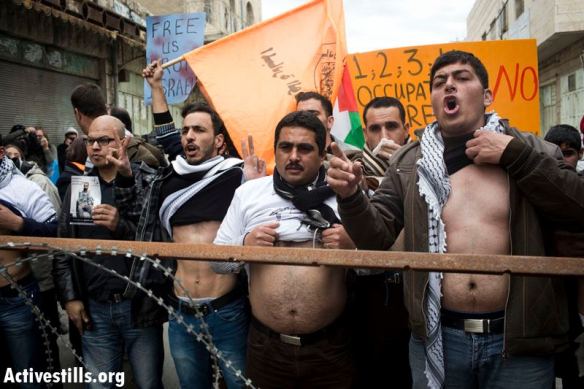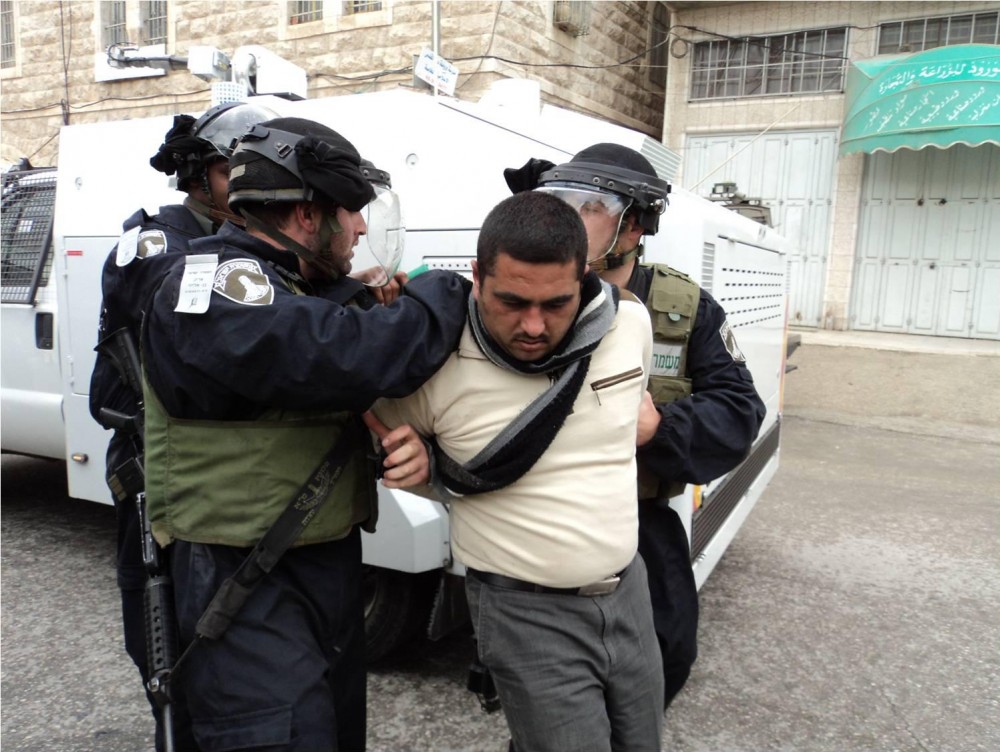
ACTION ALERT: OPEN SHUHADA STREET DEMONSTRATION, HEBRON: FRIDAY 21 FEBRUARY 2014
On Friday 21 February 2014 activists have announced a day of action to demand the opening of Shuhada Street in Hebron. The worldwide action will take place on 21 February 2014 and supporters around the world are encouraged to stage their own action in solidarity.
Palestinian action
Day: Friday 21 February
Time: 12:00pm
Place: Bab Alzaweih, Ali Bakaa Mosque
For more information: email or phone +972 569 222 796 (Arabic and English speaking)
Activists will then proceed to stage a demonstration at the entrance of Shuhada Street and demand it’s opening to Palestinians.
Background
Shuhada Street is one of the main streets in Hebron, the commercial heart of Palestine. It connects the southern and northern neighbourhoods and is a main artery in the city. In its heyday it contained the central vegetable market, one of the oldest schools, a Turkish bath, a wheat mill factory, a gas station and dozens of shops.
After the 1967 war and Apartheid Israel’s occupation of the remainder of Palestine they began building and establishing illegal settlements in the heart of the City and attempting to create a permanent hold on the City, using religious claims to do so. Kiryat Arba was one of the first of these such illegal settlements, built on stolen Palestinian land.
In 1979, the Likud led government of Apartheid Israel, allowed settlers from Kiryat Arba into the heart of the City, establishing illegal settlements inside the City, near Shuhada Street, and stealing Palestinian homes and land. In early May 1980, the Israeli Army demolished a number of shops along Shuhada Street and forced Palestinian families living on the street to leave.
In 1982, the Israeli army seized a school, Osama bin Savior located at the fork of Shuhada Street near the entrance to the old town, and handed it over to the settlers, who later turned it into a religious school after adding new floors to it. The following year the Army demolished the old vegetable market, establishing in its place further illegal settlements. This forced more Palestinians to leave the area.
In 1984 the Army also took the central bus station located on the street, under the pretext of security, and turned it into a military barracks. The barracks continues to provide cover and assistance to the settlers carrying out their illegal expansionist plans. For more than a year the Army have allowed the settlers to stay inside the station “camp”.
Today there are about 350 settlers and 250 Zionist students of a religious school, located in four outposts along Shuhada Street. These settlers are responsible for acts of harassment and terrorism against the Palestinian population, which live in constant fear and danger as a result.
Settlers regularly throw stones at houses and passers-by, impeding movement in and out of houses and neighborhoods near the outposts. They use profanity against the Palestinians, ridiculing their Islamic belief and destroying their property.
All of these acts of terrorism are done with the help and knowing of the Army, in violation of the obligations of the occupying force under the Fourth Geneva Convention. The Hebron settlers are extremists, such as Baruch Marzel and Noam Federman. They were friends with the terrorist Baruch Goldstein, who killed 29 worshipers in the Ibrahimi Mosque on Friday 25 February 1994. As aa result the mosque is now divided and Palestinians are regularly denied entry to the street.
Since the beginning of the nineties the Army have set up a military checkpoint at the northern entrance of Shuhada Street, blocking the entry of vehicles and Palestinians.
After the Oslo Accords, life was supposed to be returned to the Palestinians of Hebron and particularly Shuhada Street. The agreement called “the Israeli – Palestinian Interim Agreement on the West Bank and the Gaza Strip”, signed in Washington on 28 September 1995 states:
Article VII In item No. 7: procedures and arrangements for the normalization of life in the old town of Hebron and the procedures to be taken immediately after the signing of this Agreement includes:
A . Open wholesale market.
B . Remove the barrier on the road leading from Abu Sunaina Martyrs road to facilitate the movement on these two routes .
Apartheid Israel did not abide by this agreement. In early October of 2000, the Army imposed a curfew on Shuhada Street and about 20% of the city of Hebron. According to the statistics of the Hebron Rehabilitation Committee curfew was in place for a period of 585 days during a three year period. This was accompanied by arbitrary measures, including the bombing of shops, looting and closures of the Old City.
Despite the lifting of the curfew the Army continue to prevent the movement of Palestinian vehicles in Shuhada Street and other streets of the city. They also prevent the movement of pedestrians in most parts of the street. Due to these closures Palestinians are forced to make long round journeys to reach relatively nearby areas of the City. The remaining residents of the street are often forced to access their homes through the homes of neighbours or by climbing the rooftops and balconies .
In light of the continued closure of Shuhada Street, the economic heart of Hebron, the popular resistance committees of Hebron announced a day of action, coinciding with the anniversary of the massacre, at the hands of an extremist Jewish settler, of Palestinians worshiping in the Ibrahimi Mosque.
On Friday 21 February 2014 the popular resistance has requested that international friends and supporters organised solidarity actions worldwide. Those inside Palestine will protest at the entrance of Shuhada Street on the same day and demand it’s opening and the free movement of Palestinians.
